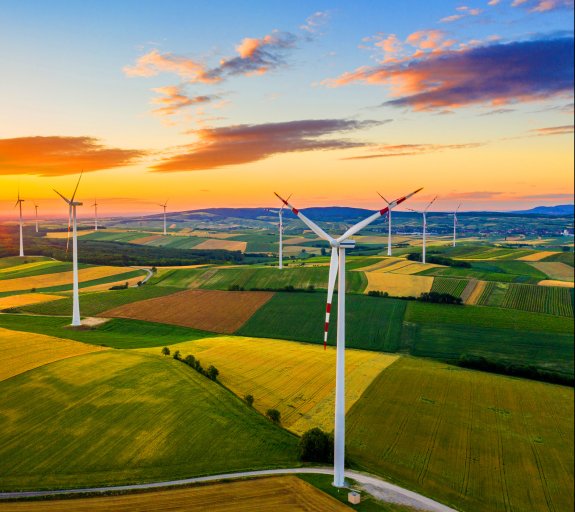
The impact of the Ukraine crisis on climate change
What the impact of war means for the race to net zero
- Russia’s invasion of Ukraine has significantly disrupted energy markets and accelerated the EU’s ambition to reduce its dependence on Russian fossil fuels.
- The European Commission plans to accelerate its already ambitious renewable technology implementation plans, which should raise the average emissions reduction pace to -5.0% per annum, from -4.8%.
- However, we are sceptical of Europe’s ability to pivot away from Russian gas as quickly as planned, and of its goals to grow renewable technology, particularly wind, at the envisaged pace. Even as planned, we estimate Europe will remain vulnerable to any interruption of gas supplies until 2024 – in practice this could be longer.
- The expected gas shortfall is likely to be met by existing fossil fuel capacity, including an increase in coal-fired generation. This will likely raise emissions to a range that is likely to be higher over the coming decade than either ‘Fit for 55’ or the EU’s new plans suggest.
- The 1970s marked a key turning point in oil intensity usage. The current crisis could mark a similar turning point for energy markets ushering in a range of new technologies to lower emissions output.
War in Ukraine will impact the battle against climate change
There are no doubt multiple factors that led to Russia’s decision to invade Ukraine. One was likely to have been a calculation that European dependence on Russian fossil fuels – particularly gas – would limit the severity of any resulting sanctions on Russia from the West. Such a judgement would have considered low European gas inventories, elevated inflation pressures and the fact that Europe’s Fit for 55 climate action plan envisaged a gradual reduction of gas imports over the coming decade in a bid to reduce greenhouse gas (GHG) emissions by 55% of 1990 levels by 2030. Such an analysis would have suggested some leverage of Russian gas supply now, but that would be likely to fade over time.
Such a calculation now appears misplaced. The sanctions against Russia have been deeper, more far-reaching, and more unified than many had expected. Moreover, the consequence of the inevitable increase in energy prices – particularly for European natural gas – has been for the European Commission to propose an even quicker shift in gas imports to reduce Europe’s dependency on Russian supply. Europe has already banned Russian coal, but it is now considering sanctions on Russian imports of oil and even gas.
In this paper, we look at Europe’s plans to reduce its dependency on Russian gas. We calculate the likely impact on the EU’s GHG emissions if Russian gas supplies to Europe were halted – requiring substitution, and higher-emitting fuels, to be used for generation capacity to temporarily fill the breach. However, in the medium term the swifter shift to non-fossil fuel generation would likely see emissions fall faster. We then critically assess the plausibility of these assumptions. Exhibit 1 illustrates our estimates of the impact on GHG emissions of the EU’s new plans, and an estimated range of a likely path of emissions.

Our experts and investment teams outline their key convictions
Visit the instituteDisclaimer
BNP Paribas Group's acquisition of AXA Investment Managers was completed on 1 July 2025, and AXA Investment Managers is now part of BNP Paribas Group.
This website is published by AXA Investment Managers Asia Limited (“AXA IM HK”), an entity licensed by the Securities and Futures Commission of Hong Kong (“SFC”), for general circulation and informational purposes only. It does not constitute investment research or financial analysis relating to transactions in financial instruments, nor does it constitute on the part of AXA Investment Managers or its affiliated companies an offer to buy, sell or enter into any transactions in respect of any investments, products or services, and should not be considered as solicitation or investment, legal, tax or any other advice, a recommendation for an investment strategy or a personalised recommendation to buy or sell securities under any applicable law or regulation. It has been prepared without taking into account the specific personal circumstances, investment objectives, financial situation, investment knowledge or particular needs of any particular person and may be subject to change at any time without notice. Offering may be made only on the basis of the information disclosed in the relevant offering documents. Please consult independent financial or other professional advisers if you are unsure about any information contained herein.
Due to its simplification, this publication is partial and opinions, estimates and forecasts herein are subjective and subject to change without notice. There is no guarantee such opinions, estimates and forecasts made will come to pass. Actual results of operations and achievements may differ materially. Data, figures, declarations, analysis, predictions and other information in this publication is provided based on our state of knowledge at the time of creation of this publication. Information herein may be obtained from sources believed to be reliable. AXA IM HK has reasonable belief that such information is accurate, complete and up-to-date. To the maximum extent permitted by law, AXA IM HK, its affiliates, directors, officers or employees take no responsibility for the data provided by third party, including the accuracy of such data. This material does not contain sufficient information to support an investment decision. References to companies (if any) are for illustrative purposes only and should not be viewed as investment recommendations or solicitations.
All investment involves risk, including the loss of capital. The value of investments and the income from them can fluctuate and that past performance is no guarantee of future returns, investors may not get back the amount originally invested. Investors should not make any investment decision based on this material alone.
Some of the services listed on this Website may not be available for offer to retail investors.
This Website has not been reviewed by the SFC. © 2025 AXA Investment Managers. All rights reserved.